How to Read “A great mountain does not refuse soil”
Taisan wa dojō wo yuzurazu
Meaning of “A great mountain does not refuse soil”
This proverb means that truly great people accept even small or seemingly insignificant things. By doing so, they continue to grow even greater.
Just as tall mountains are formed by countless tiny grains of soil piling up, excellent leaders and big-hearted people never look down on small matters or minor contributions.
Instead, they carefully accept each one. This builds their character, abilities, and influence over time.
People use this proverb when talking about leadership or a person’s capacity. It praises or encourages the generosity to accept all people and opinions, regardless of status, position, or ability level.
Even today, people understand it as a way to evaluate the attitude of organizational leaders and those in positions of authority.
Origin and Etymology
This proverb likely comes from words found in the ancient Chinese text “Records of the Grand Historian” (Shiji). The leading theory is that it originated from a memorial written by Li Si, a chancellor who served China’s First Emperor of Qin.
Li Si opposed a movement to expel foreigners. In his argument, he used this expression to make his point.
Li Si wrote: “Mount Tai does not refuse soil, therefore it can achieve its greatness.” He explained that the great Mount Tai became so massive because it accepts even the smallest particles of soil without refusing them.
He then argued that excellent rulers can also make their nations great by accepting talented people regardless of their status or origin.
Mount Tai is a famous mountain in China that has been considered sacred since ancient times. The contrast between this mountain’s grandeur and the countless tiny soil particles that form it deeply resonated with people.
When the saying came to Japan, “Tai Mountain” was sometimes written as “Taisan,” but the meaning remains the same.
The teaching that true greatness comes from the generosity to accept everything without looking down on small things has been passed down through the ages.
Usage Examples
- That company president embodies “A great mountain does not refuse soil” by seriously listening even to new employees’ opinions, which is why the company keeps growing
- She became an excellent researcher because, like “A great mountain does not refuse soil,” she never overlooked even the smallest piece of data
Universal Wisdom
Why do people tend to look down on small things as they become bigger themselves? Throughout history and across cultures, we repeatedly see successful people become arrogant and stop paying attention to minor details.
This proverb sees through this common human trap. It teaches us what true greatness really means.
Truly large things are actually accumulations of countless small things. Each grain of soil forming a mountain, each drop of water filling an ocean.
Everything magnificent in this world exists through the piling up of tiny elements.
Yet people get distracted by visible size and glamour. They forget the small things that form the foundation.
Our ancestors understood that human growth and organizational development follow this same principle. Those who look down on small lessons cannot gain great wisdom.
Those who neglect minor relationships cannot build deep trust.
Each experience, each encounter with another person, each word spoken. All of these are the soil that shapes who we are.
A truly great person can notice even a single pebble at their feet while standing in a high position. Humility and tolerance are the forces that make people truly great.
When AI Hears This
Network science has a principle called “preferential attachment.” This means that nodes (points) that already have many connections are more likely to gain new connections.
When we analyze the link structure of the internet, the distribution of connections follows a “power law.”
The network consists of a few giant hubs and many small nodes.
What matters here is the condition for giant hubs to keep growing. Google and Amazon don’t exclude even the smallest search queries or niche products.
Words searched only a few times per year, products that sell only a few units annually—they incorporate everything into their systems.
This “non-selective attitude” maximizes the total number of network nodes. As a result, it exponentially increases the influence of the central hub.
In fact, about 40 percent of Amazon’s sales come from niche products that physical stores wouldn’t carry. This is called the “long tail phenomenon.”
Its essence is that the mountain’s total mass increases by not refusing a single grain of soil.
The moment a great mountain starts selecting soil, growth stops. In other words, this proverb shows that “not refusing” is the strongest strategy for expanding scale.
Tolerance is not just a virtue—it’s a mathematical condition for dominance in the network age.
Lessons for Today
Modern society emphasizes efficiency so much that we increasingly cut away small things. Things that don’t show immediate results, things that aren’t noticeable, things that can’t be quantified—these tend to be seen as worthless.
But this proverb reminds us of something important.
Look again at the small things around you. A junior colleague’s casual question, a minor insight from daily life, an experience you thought insignificant.
All of these are nutrients that enrich you.
Rather than having tens of thousands of social media followers, treasure the conversation with the person in front of you. Rather than moving big projects, accumulate small improvements.
This attitude will ultimately make you grow significantly.
If you’re in a leadership position, this matters even more. A subordinate’s small suggestion, a customer’s minor complaint, detailed voices from the field.
The generosity to accept these things strengthens the entire organization.
Don’t refuse, don’t look down, make everything your nourishment. That humility is what makes you truly great.



Comments